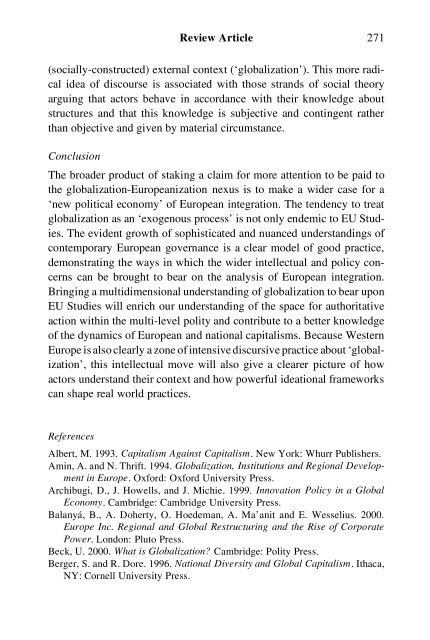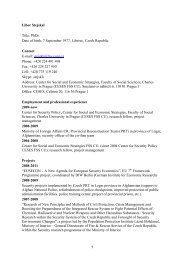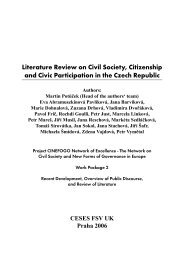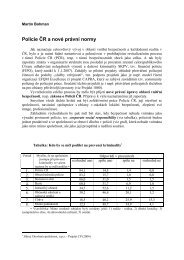Review Article: Globalization and Europeanization
Review Article: Globalization and Europeanization
Review Article: Globalization and Europeanization
Create successful ePaper yourself
Turn your PDF publications into a flip-book with our unique Google optimized e-Paper software.
<strong>Review</strong> <strong>Article</strong> 271<br />
(socially-constructed) external context (‘globalization’). This more radical<br />
idea of discourse is associated with those str<strong>and</strong>s of social theory<br />
arguing that actors behave in accordance with their knowledge about<br />
structures <strong>and</strong> that this knowledge is subjective <strong>and</strong> contingent rather<br />
than objective <strong>and</strong> given by material circumstance.<br />
Conclusion<br />
The broader product of staking a claim for more attention to be paid to<br />
the globalization-<strong>Europeanization</strong> nexus is to make a wider case for a<br />
‘new political economy’ of European integration. The tendency to treat<br />
globalization as an ‘exogenous process’ is not only endemic to EU Studies.<br />
The evident growth of sophisticated <strong>and</strong> nuanced underst<strong>and</strong>ings of<br />
contemporary European governance is a clear model of good practice,<br />
demonstrating the ways in which the wider intellectual <strong>and</strong> policy concerns<br />
can be brought to bear on the analysis of European integration.<br />
Bringing a multidimensional underst<strong>and</strong>ing of globalization to bear upon<br />
EU Studies will enrich our underst<strong>and</strong>ing of the space for authoritative<br />
action within the multi-level polity <strong>and</strong> contribute to a better knowledge<br />
of the dynamics of European <strong>and</strong> national capitalisms. Because Western<br />
Europe is also clearly a zone of intensive discursive practice about ‘globalization’,<br />
this intellectual move will also give a clearer picture of how<br />
actors underst<strong>and</strong> their context <strong>and</strong> how powerful ideational frameworks<br />
can shape real world practices.<br />
References<br />
Albert, M. 1993. Capitalism Against Capitalism. New York: Whurr Publishers.<br />
Amin, A. <strong>and</strong> N. Thrift. 1994. <strong>Globalization</strong>, Institutions <strong>and</strong> Regional Development<br />
in Europe. Oxford: Oxford University Press.<br />
Archibugi, D., J. Howells, <strong>and</strong> J. Michie. 1999. Innovation Policy in a Global<br />
Economy. Cambridge: Cambridge University Press.<br />
Balanyá, B., A. Doherty, O. Hoedeman, A. Ma’anit <strong>and</strong> E. Wesselius. 2000.<br />
Europe Inc. Regional <strong>and</strong> Global Restructuring <strong>and</strong> the Rise of Corporate<br />
Power. London: Pluto Press.<br />
Beck, U. 2000. What is <strong>Globalization</strong>? Cambridge: Polity Press.<br />
Berger, S. <strong>and</strong> R. Dore. 1996. National Diversity <strong>and</strong> Global Capitalism. Ithaca,<br />
NY: Cornell University Press.











